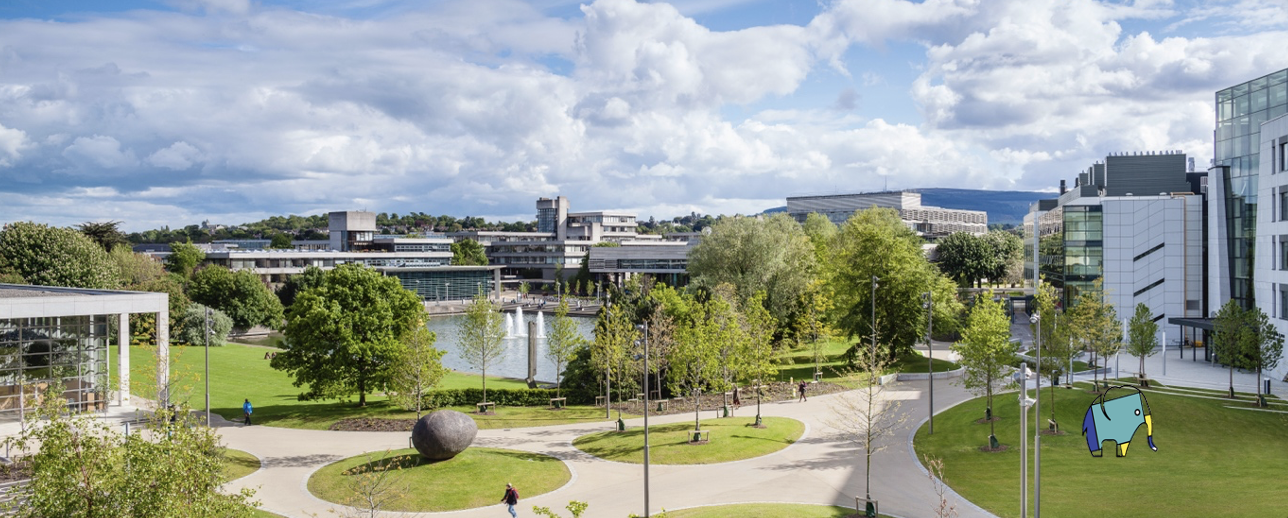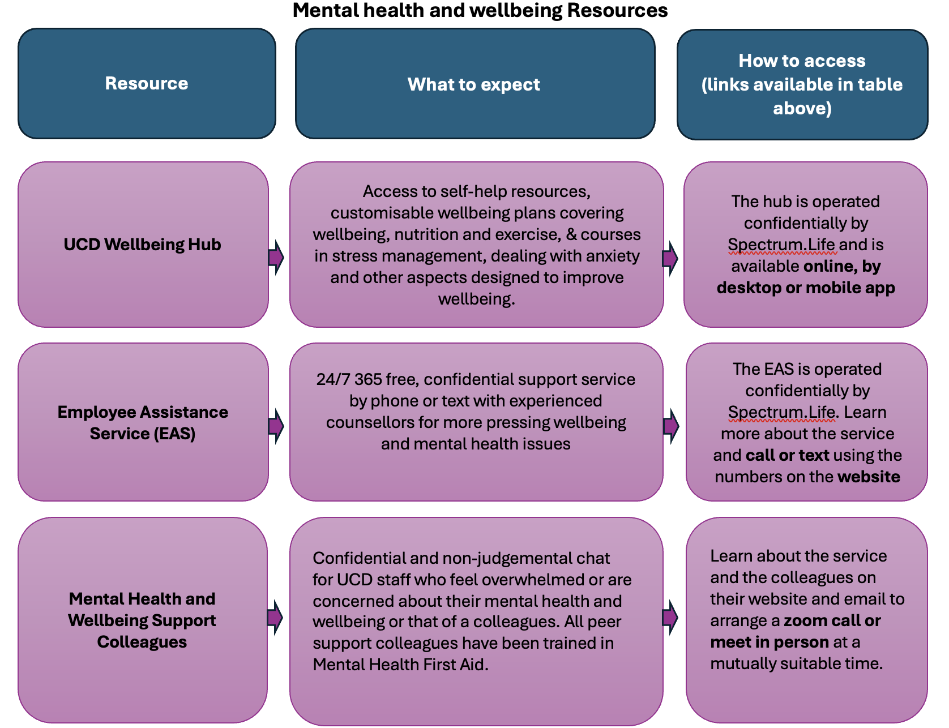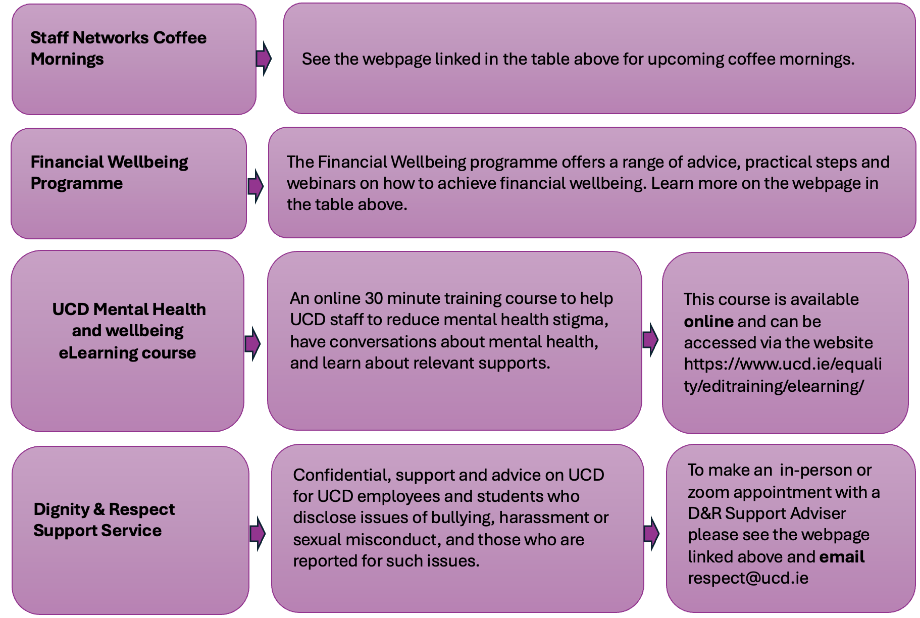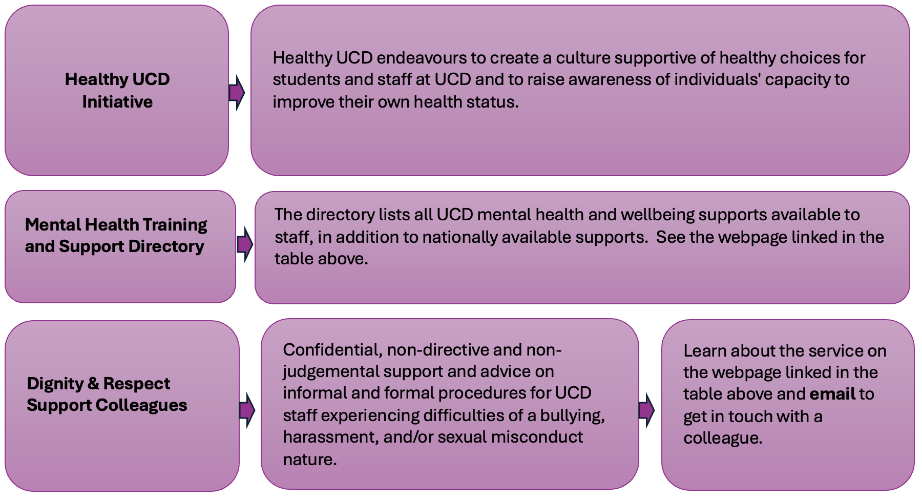
Mental Health, Wellbeing and Research Culture
“… we can’t have good researchers if they don’t feel well in their work environment.” Survey respondent, UCD Research Culture Survey (2021)
The first UCD Research Culture survey, conducted in 2021, explored perceptions of research culture among the research community in UCD.
This survey did not explicitly include a focus on mental health and wellbeing, however a number of responses to open-ended questions indicated that members of the research community perceive wellbeing-related factors as central aspects of research culture.
In response, we are conducting research to further evaluate aspects of research culture which support mental health and wellbeing and those which need improvement among doctoral researchers, postdoctoral researchers, faculty, and professional research staff, such as research managers and technical officers.
The mental health and wellbeing of the research community is vital in itself, and is integral to the success of academic institutions and their research quality. As such, the UCD Research Culture Team aims to learn how our research culture can be improved to create a more positive, inclusive and affirming work environment for our research community and to improve wellbeing. In order to do this, we must first assess the levels of mental health and wellbeing in the research community, and examine how these are associated with research culture.
Lack of research on mental health and wellbeing in the research community
The research literature on the mental health of the research community is sparse, but what exists suggests that levels of mental health are low in comparison to general populations. The mental health of the research community has until recently been underexplored. However emerging research suggests that the mental health and wellbeing of those working in research is lower than population norms. A study in the UK found that more than half of academic staff experienced elevated depression symptoms (Wray & Kinman, 2021). A survey by the Wellcome Trust across the UK found that 53% of researchers have sought professional support for their mental health (Moran et al., 2020).
To date, little research has been published on how aspects of research culture, such as how research is valued, collegiality, collaboration, or feeling able to spend time undertaking continual professional development, relate to mental health and wellbeing.
In response to the open-ended responses from the UCD research community in the 2021 survey, the UCD Research Culture team included a number of additional scales to measure mental health and wellbeing in the 2023 Research Culture survey. Questions were also added which were derived from the Wellcome Trust Research Culture survey conducted in 2019. These additional questions focus on aspects of research culture that may be more likely to impact wellbeing such as feeling support from peers and colleagues when experiencing personal problems.
Methods
Using mixed quantitative and qualitative analysis, and including innovative statistical techniques, the UCD Research Culture team is exploring the intersection of mental health, wellbeing, and research culture with the aim of identifying aspects of research culture which promote positive mental health and increased wellbeing and which aspects need improvement.
Questions and scales assessing mental health and wellbeing in the 2023 survey included:
| Psychological scales |
|
| Measure |
Psychological construct assessed |
| Patient Health Questionnaire-8 (PHQ-8) |
Depressive symptoms |
| Generalized Anxiety Disorder Scale-7 (GAD-7) |
Anxiety symptoms |
| WHO Wellbeing Index (WHO-5) |
Wellbeing |
| Additional questions on mental health and wellbeing |
| 16 questions were formulated to identify work/research/institution-related aspects which may impact on wellbeing, adapted from the Wellcome Research Culture Survey (2019). Additional questions on this topic were developed by the UCD Research Culture team. |
| Cohort specific questions |
| 11 questions were formulated to identify work/research/institution-related aspects which may impact on wellbeing, adapted from the Wellcome Research Culture Survey (2019). Four additional questions were developed by the UCD Research Culture team. |
Analysis
Statistical analyses will be conducted to explore the relationships between research culture and mental health and wellbeing. These will include:
- Descriptive statistics to identify levels of mean levels of depression, anxiety and wellbeing in the research community as a whole, and by socio-demographic characteristics and research role.
- Regression analyses to identify which aspects of research culture are positively or negatively associated with depression, anxiety and wellbeing.
- Network analyses:
- Bridge analyses to identify which aspects of research culture act as bridges between research culture and decreased mental health
- Cluster analyses to identify unique clusters within research culture
Additionally, qualitative data gathered from the open ended questions asked in the Research Culture 2023 survey will be analysed using content analysis to identify themes related to what the research community within UCD believes could be done to improve research culture, and in what ways research culture has improved or declined since the initial Research Culture survey in 2021.
In addition to the main bank of questions on research culture and mental health and wellbeing, we wanted to know if members of the research community understand where in the University they could go for information or support on the following topics, and whether they would like to know more about any of these topics:
- Employee Assistance Service
- Wellbeing Hub
- Mental Health Peer Support Group
- Dignity & Respect Support Service (D&RSS)
- Dignity & Respect Support Colleagues
- Mental Health and Wellbeing Seminars
- Healthy UCD
- Parent Buddy Programme
- Financial Wellbeing Programme
- Mental Health Training and Support Directory
- Staff Networks Coffee Mornings
Among the top priorities for each cohort of the research community to learn more about were the Wellbeing Hub, the employee assistance service, the Mental Health Peer Support Group and the Mental Health and Wellbeing Seminars (based on figures from the 2023 UCD Research Culture Survey)
| Faculty |
Graduate research students |
Postdoctoral research associates |
Research managers/administration |
Technical officers |
| Wellbeing Hub (39%) |
Wellbeing Hub (47%) |
Wellbeing Hub (33%) |
||
| Wellbeing Hub(40%) |
||||
| Healthy UCD (30%) |
Mental Health and Wellbeing Seminars (37%) |
|||
| Healthy UCD (35%) |
||||
| Mental Health and Wellbeing Seminars (31%) |



News and updates:
- Dr Hugh Fulham-McQuillan discussed the UCD Research Culture Team’s innovative approach to exploring the associations between mental health, wellbeing and Research Culture and taking part in a panel discussion on the topic of measuring Research Cultures at Strathclyde University’s Research Culture week in March 2025.
- A research paper based on the quantitative analyses is being finalised for peer reviewed publication.
- Dr Hugh Fulham-McQuillan presented preliminary findings from the quantitative analyses at the Warwick International Research Culture Conference in September, 2024 and the Wellcome Institutional Research Culture Community event in June, 2024.
